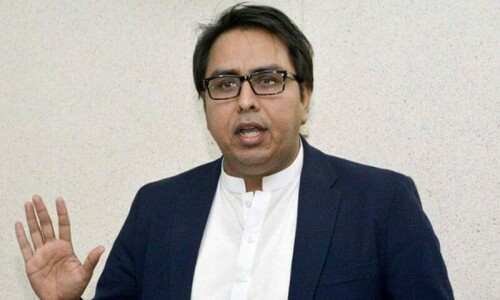LAHORE, Dec 2: Freedom from pain and an easy access to pain therapy as a measure of respect should be seen as a right of every cancer patient.
Addressing an international workshop on “Palliative Care for Cancer Patients”, at the University of Health Sciences (UHS) here on Monday, a former consultant of the World Health Organization and an American expert on palliative medicine, Prof Dr Pamela M. Sutton said cancer pain relief could not be considered in isolation.
“Pain relief should be seen as part of a comprehensive pattern of care which encompasses physical, psychological, social and spiritual aspects of suffering and which has come to be known as palliative care”, she said.
She said the cancer was a major world problem and every year about seven million new cases were diagnosed, half of them in developing countries, and about five million people died.
She said that five of the eight most common forms of cancer were more prevalent in the developing countries.
“Even if diagnosis is made at an early stage, the treatment is curative in only three types while palliative care is needed in all types,” she said.
Joann Rosencrans, a veteran nurse from Florida, USA, said that nurses had a major role to play in palliative care.
She said nurses had the responsibility to provide information, counselling and education to patients and families and continuity of care between the home and hospital.
“Because of their closeness to patients, nurses are ideally placed to monitor and evaluate pain and symptom control.” she said.
UHS Vice-Chancellor Maj-Gen Prof Muhammad Aslam (retired) said the diagnosis of cancer could be devastating. “People who are put on chemotherapies or radiation may have side effects that palliative support can help alleviate,” he said.He said the medicine was a humanistic discipline at its core and doctors should aim to “help people live the lives that they want to live”.
Prof Dr Shahryar, the dean of Oncology at King Edward Medical University, Lahore, and the Cancer Care Hospital and Research Centre president, said the palliative care could be helpful for any patient with a serious illness that caused discomfort, anxiety, nausea or other physical or emotional distress.
He said around 160,000 patients were added to the existing number of cancer patients in Punjab every year whereas only 590 beds and 55 oncologists were available for these patients.
Limited capacities for palliative care, cancer emergencies and bone marrow transplants left a majority of patients without access to proper treatment or care, he said.
Prof Shahryar stressed the need to have a network of cancer hospitals which could provide a standard care to cancer patients, especially the poor and marginalized, without any discrimination.
The five-day workshop is being organized by the UHS in collaboration with the Cancer Care Hospital and Research Centre and the Punjab Health Department. It aims at training physicians and nurses in palliative medicine.













































Dear visitor, the comments section is undergoing an overhaul and will return soon.